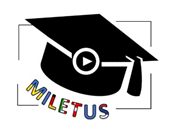
MILETUS project addresses capacity building in the field of mobility for students, including PhD students, from Serbia and Ukraine. This is the third Call for applications within the MILETUS project which is aimed at the mobility of PhD students. The proposed mobility program for PhD students combines both real and virtual mobility runs. The main objectives of the mobility program for PhD studentsare enhancing of research quality and development of transferable skills through interdisciplinary project based research topics. Blended mobility provides PhD students an opportunity for joint work with access to research materials and resources of host university in close collaboration with research fellows and professors of host universities.
About MILETUS blended mobility program for PhD students
– blended mobility run for PhD students from Ukraine and Serbia is a combination of virtual and real mobility run – a total of 37 students from Partner Universities in Ukraine and Serbia will be selected for the blended mobility run:
- National University of Kyiv-Mohyla Academy, Kyiv, Ukraine
- Private Higher Education Institution Kharkiv University of Humanities, Kharkiv, Ukraine
- Mykolayiv National Agrarian University, Mykolayiv, Ukraine
- Lesya Ukrainka Eastern European National University, Lutsk, Ukraine
- University of Novi Sad, Novi Sad, Serbia
- University of Nis, Nis, Serbia
- Singidunum University, Belgrade, Serbia
– the students from the Ukrainian universities can go to:
- University of Novi Sad, Novi Sad, Serbia
- University of Nis, Nis, Serbia
- Singidunum University, Belgrade, Serbia
- Aalborg University, Denmark
- Hamburg University of Technology, Germany
- Politecnico di Milano, Italy
– the students from the Ukrainian universities can go to:
- National University of Kyiv-Mohyla Academy, Kyiv, Ukraine
- Private Higher Education Institution Kharkiv University of Humanities, Kharkiv, Ukraine
- Mykolayiv National Agrarian University, Mykolayiv, Ukraine
- Lesya Ukrainka Eastern European National University, Lutsk, Ukraine
- Aalborg University, Denmark
- Hamburg University of Technology, Germany
- Politecnico di Milano, Italy
– the blended mobility run is divided into 3 phases:
Phase I (virtual): During the first preliminary phase students under the supervision of professors of host university should define the joint research topic, research methodology and expected results of the research (e.g. scientific papers, conference material etc.). PhD students will work in international and interdisciplinary groups of 2 -3 persons.
Phase II (real): During the second phase PhD students will travel to the host universities for 2 months for active cooperation with research fellows and professors of host universities. This allows the PhD students to experience exchange, to access research materials and resources and to conduct research activity at the host institution.
Phase III (virtual): The third and final phase involves evaluation of the results and finalization of the joint paper.
Timescale of the blended mobility run for PhD students
– The duration of the blended mobility run is 5,5 months
– Planned period of the blended mobility is from January 2019 until June 2019 with real phase from March 2019 until April 2019.
Who can apply?
– full-time PhD student at the Partner Universities in Serbia and Ukraine
– candidates with high language proficiency in English (at least B2 – upper-intermediate level)
– candidates with high level of motivation to be enrolled in the blended mobility run.
How to apply?
Those PhD students interested in this blended mobility should submit:
1. Electronic application form
2. Motivation letter in English (max 1 page). Motivation letter should present reasoning to participate in the blended mobility run, the competencies and skills to be expected achieve, future perspectives and aspirations after mobility run)
3. Research proposal in English (max 3-5 pages). The structure of the research proposal is as follows: research field, title, short abstract, aims, theoretical framework and methodology, work plan, bibliographical references
4. Curriculum vitae (CV) in English
5. Enrollment certificate or similar document on current PhD student status issued by home institution in English or local language of your home institution (this document should contain the name of your institution, level of study, field of study, year of study)
6. List of research publications (desirable but not mandatory).
The documents 2-6 should be attached to the E-form
Deadline for applications: 15th December 2018
More information on the Call can be found by the link
